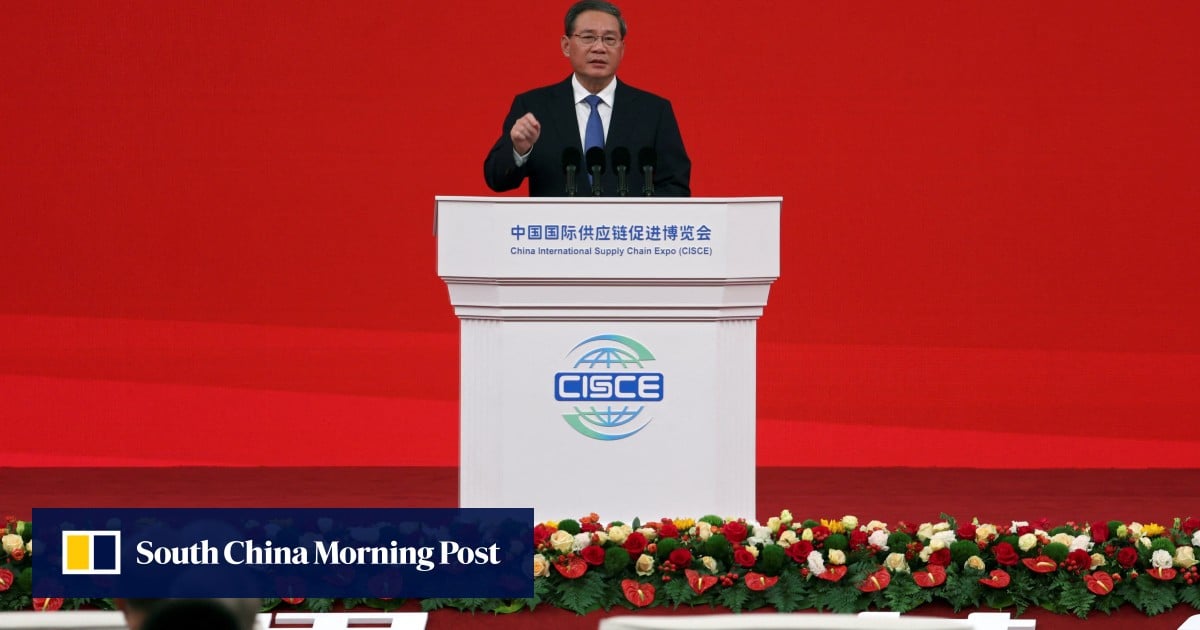
Premier Li Qiang vowed to build closer supply chain ties as part of China’s latest efforts to retain foreign investment amid “de-risking” moves from Western economies.
“We are willing to build closer production and industrial supply chain partnerships with all countries,” Li said during the opening ceremony of the inaugural China International Supply Chain Expo on Tuesday in Beijing.
He warned of “challenges and risks brought by protectionism and uncontrolled globalisation”, and said China would continue to create an international and rule of law-based business environment.
Foreign businesses have been moving investments and de-risking their supply chains away from China due to fears of over-reliance as geopolitical and domestic uncertainties mount.
We also expect that the opportunities China can provide for strengthening global supply chains will be showcased,
Jens Eskelund
Beijing has been promoting the five-day event as a demonstration that China is still the indispensable so-called world factory by having global brands, including Apple and Tesla, among the 550 exhibitors, of which 130 are foreign companies.
Foreign chambers of commerce said the expo could provide a window to assess the opportunities still on offer in China, and to have a clearer view on how other businesses are assessing the market.
Jens Eskelund, president of the European Union Chamber of Commerce in China, said the expo is expected to show “a clearer position on how China sees its role in global supply chains, as well as how some of the pressing issues in trade and globalisation can be addressed”.
“We also expect that the opportunities China can provide for strengthening global supply chains will be showcased,” Eskelund said.
Loh Wee Keng, chairman of the Malaysian Chamber of Commerce and Industry in China, said there is an eagerness to observe larger multinational corporations that still have operations in China.
Many of our members will formulate our own investment plans according to these corporations’ development strategy
Loh Wee Keng
“We mainly want to understand multinational corporations’ current operations and planning in China,” said Loh, who heads the chamber of more than 600 members.
Since China relaxed its stringent coronavirus controls at the beginning of the year, Beijing has begun an all-out push to woo foreign investors.
However, China reported its first-ever quarterly deficit in direct investment liabilities – a broad measure of foreign direct investment that includes foreign companies’ retained earnings in China – in the third quarter.
“Many of our members will formulate their own investment plans according to these corporations’ development strategy,” Loh added.
“For example, if there is a certain industry that still has its entire supply chain in China, it would be a forecast to show that this industry probably still has huge potential in the country.”
To offset the downward trend, Beijing has unveiled a series of measures in a bid to address waning confidence, which has been hit by policy uncertainties and a tightened grip on national security amid geopolitical headwinds.
It also announced the removal of investment barriers to the manufacturing sector and the opening up of part of the digital economy in selective regions, while also expanding visa-free entry to more countries to facilitate inbound travel.
China’s goal to underpin its position in the global supply chain would, however, also be closely affected by the revised expectations that global economic growth is seen to be on the downside.
“Companies are scrutinising costs to protect their margins. Invariably, supply chains will be a target, as 50 to 75 per cent of the cost of doing business is influenced directly by supply chains,” said Mads Lauritzen, Asia-Pacific strategy and transformation leader at management consulting firm EY-Parthenon.
“CEOs need to scrutinise every area of their operations, from a product, asset, and geographic perspective, and decide which underperforming areas to jettison.”
Expo organiser, the China Council for the Promotion of International Trade, said American businesses account for 20 per cent of the 130 foreign exhibitors, while around a dozen European companies are also taking part.
Companies at the expo are focused on agriculture, clean energy, digital technology, health and logistics, the organiser said.
In the past year, multiple foreign chambers of commerce in China have published reports saying increasing supply chain resilience is one of the top priorities for businesses in China.
Disruptions to the supply chain include China’s coronavirus lockdowns, Russia’s invasion of Ukraine, inadequate infrastructure and rising geopolitical tensions.
News Related